Rugby is community, family and recreation, and I never for a moment believed that we would see the governing body of English Rugby, the RFU, instigate a poorly thought through, mishandled, unscientific and exclusionary transgender rugby ban, yet, this is exactly what happened on the 30th July 2022.
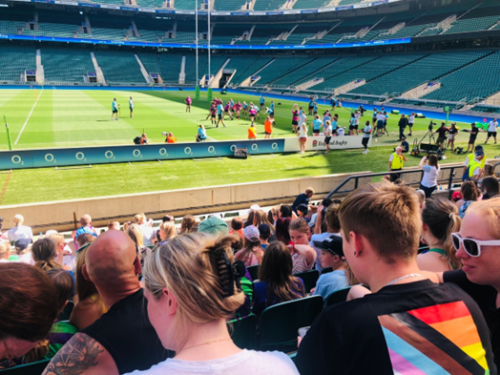
QuinsPride’s Emily Hamilton explains what’s happening to trans people in ruby after the recent ruling as well as the group’s protest which recently caught the attention of Martin Samuel in the Daily Mail and Daily Telegraph reporters.
In 2020, World Rugby; the governing body of the sport around the world introduced a de-facto ban on trans participation at elite level, citing ‘scientific studies’ which they claimed made rugby unsafe and unfair if trans players were allowed to play.
The evidence they relied on was far from conclusive, and a number of national governing bodies (NGBs), including the RFU in England, stated that the evidence was not conclusive enough to justify a ban at all levels of the game. They also stated that they would maintain the status quo of a case by case basis of assessment for trans players, with trans men being asked to sign a ‘waiver’ that they understood the risks to them in playing in the men’s game – a waiver that no cisgender player need sign, despite the obvious and well understood risks of taking to the rugby field.
In the Women’s game, some arbitrary weight and height standards were devised above which the player may be considered to be a greater risk to her team-mates, and which would weigh the balance of a medical risk assessment. This is despite the fact that more than 65% of the 2020-21 England Red Roses team themselves fell outside of these parameters, and yet no such assessment was required for them.
The system was illogical, and unfair, but at least it was not a blanket ban on any participation. I wrote to my contacts at the RFU to congratulate and thank them for putting participation and inclusion at the heart of our sport, while asking them to consider the absurdity of placing height and weight standards in a game famously designed for mixing players of all body shapes and sizes.
And then…
On the 23rd July, a press release from the RFU stated that the RFU Council, the governing body of the game, comprised like a senate of representatives from the counties, some co-opted members, some of the management team and representatives from the professional side of the game, would be meeting to discuss the ‘Gender participation policy’ – with the usual transphobic press reporting that the proposal would be the blanket exclusion of all trans women from playing, no matter their size, weight, strength, hormone levels or even if they had been subject to a testosterone driven puberty.
The reports cited ‘new scientific evidence’ and a ‘game wide survey’ with 11,000 responses.
This ‘new evidence’ was not published nor made available for scrutiny – and there is currently no new, peer reviewed study which accurately assesses the safety and/or fairness between trans women and cis women.
In the round of press interest and the scramble for those of us with an interest in inclusion, we saw the same studies repeated time and again, studies which did not include rugby-specific subjects, studies which looked at the difference between cis male and cis female performance, studies which have been misused repeatedly.
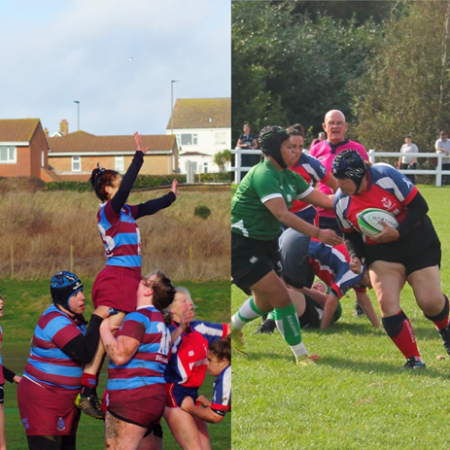
The ’game wide survey’ was also not released, nor was the methodology by which it had been conducted. When speaking with multiple women’s clubs, from the premiership down – there was no knowledge of this survey. Clubs with trans women playing in them were not approached, either generally or specifically, given that they would feel the most impact.
QuinsPride – the only professional club LGBTQ+ association in world rugby – were not contacted or advised of the survey.
Contacts of mine within the RFU told me that there was no analysis of how many of the comments came from within the game, and how many from outside, subject to manipulation by transphobic bad-faith actors.
To call it a ‘game wide survey’ is at best an exaggeration and at worst a flat-out untruth.
What became clear immediately is that those who stalk social media with transphobia across every part of life were all well aware of the survey.
Those inside the room on 30th July say that the debate was one of the most in-depth that had ever been had at the RFU, and the voting results defy the statement that it was ‘obvious’ or a ‘simple decision’ as has been claimed on social media and in the press.
33 council members voted in favour of the exclusionary policy, two abstained and 26 were against. This gives some hope that the lobbying that has gone on in the RFU and other NGBs has not become pervasive; a cause for some optimism that this illogical and unfair decision can be overturned.
There have been two protests so far, and there will be more.
These protests were respectful – making sure that the human cost of such decisions was visible. We are not talking in abstract terms, we are talking about real human beings; trans women who have played for more than 19 years without incident, without complaint and as valued team mates.
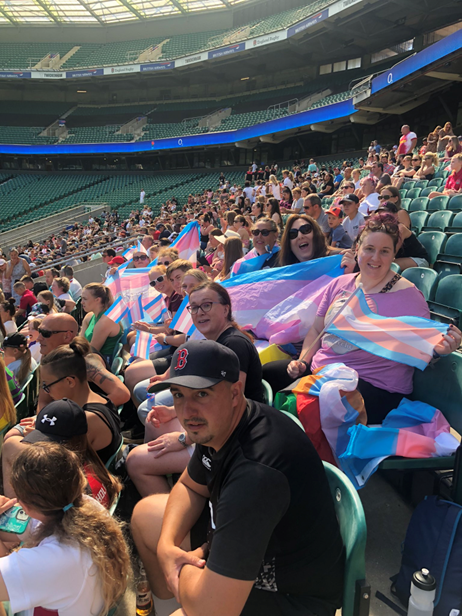
I brought together – with friends – a group of players, both cisgender and recently banned trans players to join an open training session at Twickenham for the England women’s team – we bought tickets, we displayed our flag and made it clear that we were not going away.
We were interviewed by the Daily Telegraph and the Press Association.
The Daily Telegraph asked (and hoped) that we were going to mount some sort of disruptive protest – running onto the pitch or otherwise ruining the day for the players and the crowd, including lots of children perhaps enjoying their first match at Twickenham.
They were to be disappointed. Our protest is visibility, our protest is to shame those who took away the game from an already marginalised minority, our protest is to show those other fans that trans women players are not monsters, are not bigger than their cisgender team-mates and that we deserve the right to be part of the much lauded ‘rugby family’.
The article published after stated that we had ‘crashed’ the session (we bought tickets), it engendered over 500 comments, the vast majority being simply abusive and ignorant, many of them including comments about the masculine appearance of those pictured in general terms.
Only three trans women attended and only two were pictured in the article with the vast majority being cisgender women.
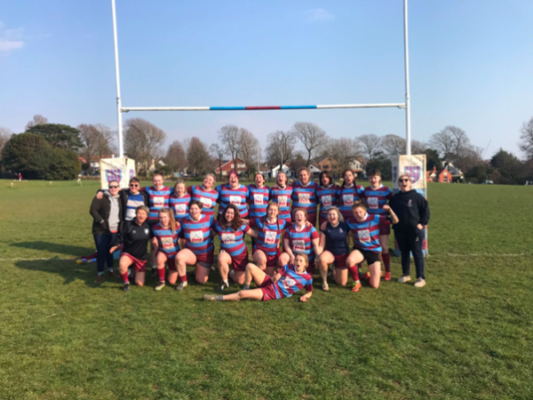
The PA piece was syndicated worldwide – in the UK often with additional reporting stating as ‘fact’ the safety and fairness concern.
Where it was picked up in places where rugby is played, but transphobia is not a national obsession, like New Zealand, the additional reporting highlighted the very small number of players, and that the NGBs in those countries had elected to maintain a ‘case by case’ basis of inclusion at grass roots.
What this tells us very clearly is that this is simply an extension of the broader ‘culture war’ stoked by government and a hostile media against trans people living their lives fully and openly and without impact on others.
That the RFU allowed itself to be ‘played’ into this situation is disgraceful.
Where do trans people in rugby go now?
The immediate priority is to have the seven excluded players (yes, there are seven trans women registered in England from a pool of 30k+) reinstated to their teams, and allowed to enjoy the chance to play again.
We then must challenge the opaque manner in which the RFU went about this.
In some ways, they gave what we call in the game a ‘hospital pass’ to the council – leaving the decision on their shoulders with scant information and evidence to secure an informed decision. It is incumbent on the RFU to reveal which of the transphobic hate groups they have met with, no matter what euphemistic names these organisations give themselves. They MUST release the ‘new’ evidence under which they have made this decision, so that it can be open to reasonable scrutiny; away from the ‘scientists’ who have given it cover, whilst simultaneously revealing their general anti-trans animus.
We must look at the legality of such a ban, whilst proponents of trans exclusion have a long and undistinguished habit of misquoting and misrepresenting the application of the Equality Act 2010 – such efforts keep being defeated in the legal setting, where hyperbole and distortion is less effective.
Finally, we must, as a rugby community, examine the use of such terms as ‘rugby for all’ and the very word ‘inclusion’. It is not a game for all if all cannot play it; it is insulting to say that trans people are only welcome if their role is to facilitate the playing of cisgender players.
The impact on me personally as a long retired player has been profound, and it’s not one that the RFU even considered. In common with other trans people within the game, we have been sent a message that we are not welcome, that we are less, that we are something to be ridiculed or our humanity denied.
They will scoff at that, but the response has borne this out; the abuse from (usually men) ‘fans’ within the game has been off the charts. The QuinsPride account did not have to block anyone on social media in the first couple of weeks of being set up but hundreds had to be removed from abusing me and my friends in the group following this announcement.
It’s given a free pass for people with no expertise in trans lives, bodies or biology to pass bigotry masquerading as comment, it’s brought back all the anxiety I felt after returning to my home stadium after transition.
The RFU probably did not intend to embolden this bigotry, but through negligence, that is exactly what they have done, and it’s left to people like me and others of good will within clubs across the country to attempt to pick up the pieces.
About QuinsPride
A couple of years ago, during the lockdowns a group of fans of Harlequins came together to create an LGBTQ+ supporter’s association, capitalising on the club’s ground-breaking work in being the first and only club in the Premiership to host a Pride Match, celebrating the LGBTQ+ rugby community.
We came up with the name QuinsPride (after a few unrepeatable options) and duly set up a committee – of which I became the first co-chair.
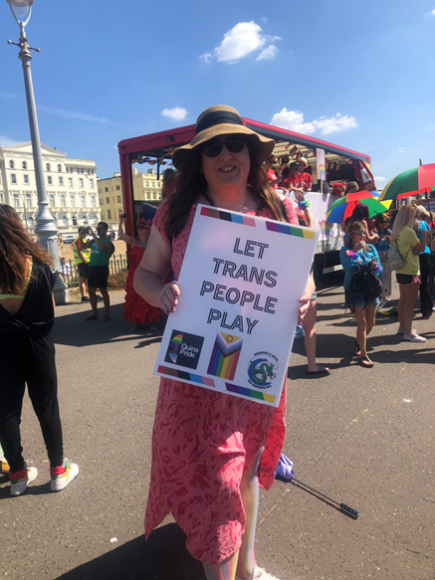
All of us have played or still play rugby, both men’s and women’s, and we represent with our members Lesbian, Gay, Bi and Trans supporters.
What surprised us was that not only were we the first and only such group in the English game, but also the only one in the world. Where rugby fans like to look down their noses at those in the round ball game – in this respect we are very, very far behind our friends in places like the Gay Gooners (Arsenal), the Proud Lillywhites (Spurs) and the Kop Outs (Liverpool).
Some in the sport say that this is because rugby ‘doesn’t have an issue’ or that ‘we’re already so inclusive’. Those words are usually spoken by people not part of a minority, and rugby crowds are still, by and large, not massively representative of the communities in which they are situated. There are still homophobic comments in the stands, sometimes racism rears it’s head and the game has long suffered with a misogyny towards women players – which we are only now starting to see some breakdown of.
As a Bi, Trans woman, who wanted to keep enjoying rugby following transition three years ago, there was a very real anxiety at coming back to the ground following the resumption of games in front of fans last year. The five-minute walk from where I park (outside the main stadium at Twickenham) to the Stoop (our home ground) felt like a marathon – and this was with a longstanding and close friend joining me.
It was this experience that led me to propose that we maintain a ‘hub’ at home games for LGBTQ+ fans and allies to meet at, knowing there will be a friendly face and to propose a ‘meet and greet’ service for first timers, where one of the group will meet fans at their car and walk into the ground with them, to reduce the anxiety – this is especially helpful for trans people who don’t have the ability always to wear an ‘invisibility shield’ in the same way as cisgender LGBQ+ people.
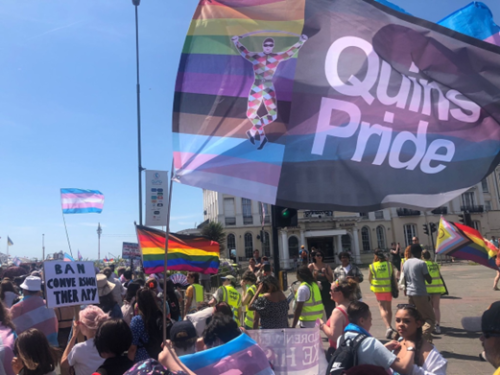
Being involved in QuinsPride has been an incredible experience, we have worked with the club to promote inclusion not only in the fan community, but also within the club as a business which employs people – some of whom may be LGBTQ+ themselves, some who may not yet have come out.
But…this is my leisure activity; I have a full-on day job, as well as a gay job as a Director of business inclusion organisation Trans in the City – where I am fully engaged 100% of my days.
I wanted QuinsPride to simply be about fun, inclusion and community, like rugby should be.










